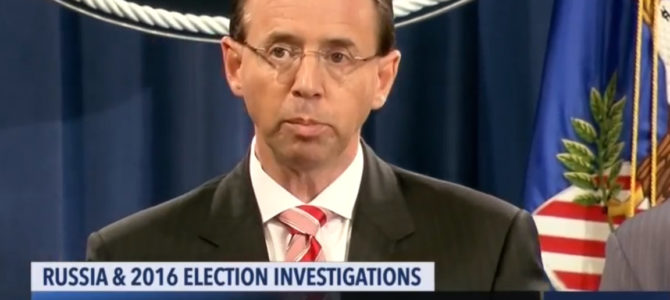
The Justice Department announced today that a federal grand jury has indicted 12 Russian intelligence officers for hacking emails from the Hillary Clinton campaign and Democratic Party during the 2016 election.
One of the things we learned from Deputy Attorney General Rod Rosenstein is that we still have no evidence of “collusion” between Donald Trump’s campaign and Russia. Special counsel Robert Mueller has brought in almost 200 indictments — and that’s great — but not one of them has shown a Russian-Trump conspiracy. Like you, I have no clue what future prosecutions will look like, but on this day Rosenstein explicitly noted that nothing in the Justice Department’s indictment featured an allegation that any American citizen had committed a crime.
For the many high-profile reporters who need Mueller’s investigation to confirm their partisan notions about a seditious president, this was, no doubt, frustrating to hear. The need to frame every morsel of news into new evidence of “collusion” has already triggered dozens of seriously misleading, sometimes fictional, “mistakes” about Trump and Russia that always skew in the very same direction.
Today was no different. This time it was serial offenders like NBC’s Ken Dilanian and Katy Tur, and reporters at outlets like The New York Times and Washington Post, who decided that they could throw together some risible evidence to illustrate a conspiracy.
“On July 27, 2016,” Christopher Ingraham at The Washington Post wrote, “Donald Trump said, ‘Russia, if you’re listening, I hope you’re able to find the 30,000 emails that are missing. Indictment: That evening, Russian operatives targeted Clinton campaign emails ‘for the first time.’”
There are a number of problems with Ingraham’s contention, which was retweeted by a number of big-name journalists and columnists, not to mention thousands of others.
First, the words “for the first time” are taken out of context. According to the indictment, this was the “first time” that Russians had targeted a specific third-party server by phishing, not the first time they targeted Clinton’s emails. Ingraham skipped over the previous sentence in the indictment, which states that hackers had even begun “spearphished individuals affiliated with the Clinton Campaign throughout the summer of 2016.”
But even if he hadn’t, it would still be misleading, because elsewhere in the indictment we learn that there were other attempts to hack the campaign going back to at least March, a number of months before Trump had even won the Republican primary.
“Trump called on Russia to hack the Clinton campaign, and they did,” Ingraham goes on. “The ‘collusion’ has been right out in the open the whole time.”
Has it, though? A New York Times headline today reads, “Trump Invited the Russians to Hack Clinton. Were They Listening?” But Clinton aide Cheryl Mills told an employee of the company that managed Hillary’s server to start deleting emails by at least December 2014, a year and a half before Trump made his inappropriate joke, and long before anyone took the Republican candidate seriously. All along were were told that these emails were unimportant, they were merely about “yoga routines” and such. By July 2016, Clinton’s server was long gone. There was nothing to hack.
Even if Trump was sending the Russians directions — during a press conference in front of the entire world — to hack Clinton’s personal emails, it must have meant that he was completely clueless about what was going on. One would imagines that Trump, a KGB asset since 1987, would be better informed. Perhaps not.
Though, you’d also think that the people who still argue that Clinton — the nominee who sent 110 emails containing classified information, 36 with secret information, 8 emails that contained “top secret” information, through an unsecure email account to avoid transparency — was being unfairly persecuted by the the media and FBI would now concede that her actions were dangerous and consequential to national security, rather than pretending she was a victim. You’d think some of the same people would wonder why the Obama administration did so little to stop the Russians from engaging in this kind of spycraft.
Instead, we’re supposed to believe that Trump, with all his supposed personal clandestine relationships with Russian intelligence (not to mention his KGB-loving staff,) would need to implore Vladimir Putin, in the most crassly obvious and public way possible, to find Hillary’s emails.
Here’s what we do know: Putin is our adversary, whether it’s 2012 or 2018. Whether it’s the misguidedly friendly policies of Barack Obama or the misguidedly friendly rhetoric of Donald Trump, Putin continues to do what he’s always done, and that’s attempt to destabilize American interests and initiate chaos. No matter how stupid the DNC was about email security, the fact that a foreign player hacked a major party’s emails during a presidential election — or ever — is an unacceptable assault on our sovereignty. It’s about time a president stood up to him.
But we know that not a single vote was altered in 2016. Russia has yet, as far as we know, to invent a mind-control ray. Every American voter’s free will was fully intact in 2016, as it will be in 2020. Acting as if Putin is an omnipotent sorcerer with the power to shift the vote count is nothing more than a transparently partisan attempt to delegitimize an election. Hearing about a politically motivated hack doesn’t nullify an election any more than hearing about a politically motivated “dossier” that’s filled with Russian-sourced rumor-mongering nullifies an election.
None of your conspiracy theories are going to change that.









